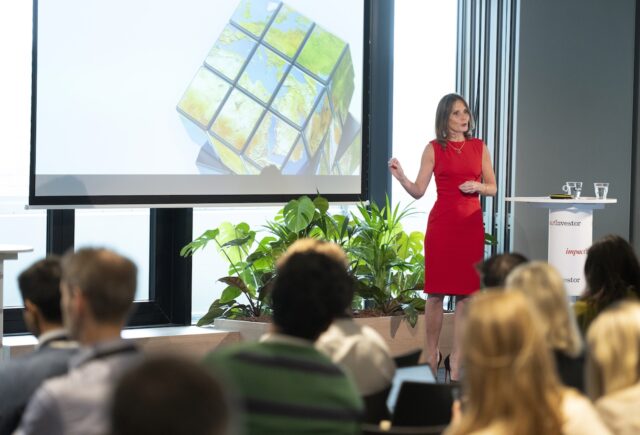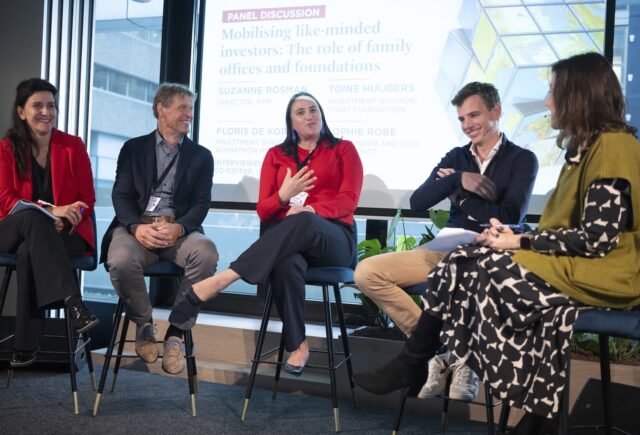Future Positive Capital is betting its venture capital on companies that can be game changers in solving the world’s biggest societal challenges. Their investment in climate-intelligence platform Cervest illustrates this.

In short
- Future Positive Capital (FPC), an early-stage VC firm based in Paris/London, was founded in 2019 to scout for companies that can “imagine a different future”.
- The VC firm plans to build a portfolio of 20 to 25 seed and follow-up investments ranging between €300,000 and €5mn.
- Its investments include Cervest (an AI climate intelligence platform), Sweetch (nano-osmotic generation for renewable energy), Biobeats (AI solution for mental health), Meatable (viable ‘lab-grown’ meat), Ynsect (insect protein at scale) and Cowboy (smart e-bikes).
Sofia Hmich and Alexandre Terrien of Future Positive Capital (FPC), an early-stage VC firm based in Paris/London, are under no illusions about where the planet is headed and what needs to be done.
“To build a resilient economy we need ‘climate intelligence’ that helps every industry and everyone affected to understand the potential impacts,” says Terrien, one of FPC’s founders.
This is why, for example, FPC is upping its stake in portfolio company Cervest, which has an AI-powered knowledge platform to help its customers make better climate-related decisions. FPC invested in Cervest’s €30mn series A investment round alongside Lower Carbon Capital, TIME Ventures, and others.
After setting up their fund in 2019 FPC has been scouting for companies that can “imagine a different future” built on values much better attuned to the socio-economic challenges of our time. Investing in companies with a mission to “solve the world’s toughest challenges” just makes sense, says co-founder Hmich.
The VC firm plans to build a portfolio of 20 to 25 seed and follow-up investments ranging between €300,000 and €5mn. Besides participating in several investment rounds of Cervest, it recently made a core investment in Sweetch (nano-osmotic generation for renewable energy).
Hmich and FPC partners have also plumped for Biobeats (AI solution for mental health), Meatable (viable ‘lab-grown’ meat), Ynsect (insect protein at scale) and Cowboy (smart e-bikes).
Climate intelligence
“Climate intelligence is business intelligence,” Terrien wrote in a blog to explain why his fund made the investment in Cervest.
The company built its automated platform around a core set of climate intelligence capabilities to help businesses and governments meet climate commitments and plan for a low-carbon green economy.
The Cervest platform is built on three layers, Terrien explained in his blog.
First, assets — with a global and queryable data set of real assets, initially focused on built infrastructure such as factories, commercial and residential buildings, hotels, power plants and ports.
Second, chronic and acute climate signals such as coastal and riverine flooding, wildfire, extreme wind and heat stress. And third, use cases — to help asset owners and managers direct their inquiries and access insights that suit their needs.
Climate damage costly
According to Terrien, climate impacts are “universal, pervasive and expensive” because they affect everyone, everywhere, and across all industries. In his view, “one day, all core decisions will require climate intelligence”.
In 2020 alone, insured losses soared in the wake of a string of major climate disasters, with the top five events topping $115bn. The true damage is likely to be much more costly, according to Christian Aid in its report ‘Counting the cost 2020: A year of climate breakdown [pdf]’.
Despite a Covid reprieve, according to the UN’s 2020 Emissions Gap Report, the world is still headed for a temperature rise in excess of 3°C this century. That, it stresses, is “far beyond the Paris Agreement goals of limiting global warming to well below 2°C”.
The Swiss Re Institute’s new Climate Economics Index warns global temperatures could even top 3°C and the world economy could shrink by 18% in the next 30 years. But if decisive action is taken to meet the Paris targets, it adds, the impact could be lessened.
Need for better data
Well-directed climate actions demand not necessarily more but better data, Terrien explains: “Existing data sets do not provide insight at the asset level and climate data quality is heavily skewed to areas of high population density.”
Terrien: “An asset owner can log onto the platform, build a portfolio of assets from the pre-populated common library, and within seconds obtain detailed historical assessments of climate risk exposure across signals back to 1970, as well as anticipated risk for decades to come, out to 2100, under varying future climate scenarios.”
Using earth science data and a mix of AI and traditional statistical analysis, Cervest’s models block out what Terrien calls “noisy data” to focus on asset-level insights across different disciplines and territories.
Richer data sets offer deeper value for all stakeholders. A recent Cervest survey backs this up. Three-quarters of UK businesses say they are concerned about climate-related risks, and yet only 10% consider measuring and disclosing such risks a priority.
Preparing for perfect storms
Productivity losses under global warming scenarios for 2030 could cost the equivalent of 80 million full-time jobs, with the poorest countries worst affected, according to the International Labour Organisation’s ‘Working on a warmer planet [pdf]’ report, which draws on climate, physiological and employment data.
Climate risks manifest in sometimes complex and unexpected ways. Climate patterns causing drought and wildfires in the south can manifest differently further north, driving excessive rainfall and flooding risks. The impacts then vary depending on the types of assets exposed to these risks.
“The perfect storm of the wrong risk, at the wrong time, over a specific class of sensitive assets can wreak havoc,” says Terrien.
For example, a late cold snap in France caused some $2.4bn in damage to wine production. Loss assessments like this point to what he calls the “existential threat” that climate change poses to our global economy.
“As climatic shocks increasingly pound assets, the push for independent, standardised analysis is only going to grow,” he predicts.





